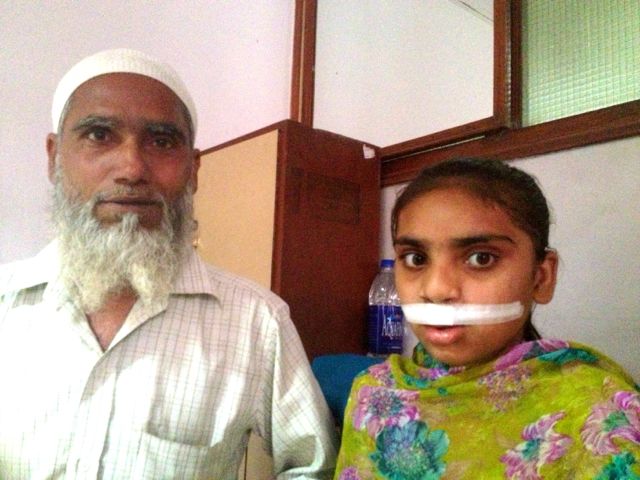Making smiles and transforming lives for free in Delhi

[caption id="attachment_11322" align="alignright" width="269" caption="Ganesh with his daughter"]
 [/caption]
[/caption]
DELHI -- On a warm summer afternoon in Delhi, children accompanied by their parents filled up a section of the Sant Pramanad Hospital, and waited patiently for their turn to get a life-altering surgery.
These children, born with cleft lips and palates, have disfigured faces and they can’t speak or eat properly. Clefts plagues one in every 700 babies born in the world.
Ganesh tickled his 18-month-old daughter, Deepika, who squealed and smiled at the hospital commotion around her. “We were not scared when she was born like this because the nurse told us it could be treated,” he said. “But I wanted a good treatment and I can’t afford it on my salary.”
Ganesh earns about 5,000 rupees or $100 per month as a car mechanic. “She needs this surgery so that she can speak and eat properly,” he said.
Smile Train, a New York based non-profit, makes this surgery available free of costs to people worldwide. The cost of one surgery, which is around $250, comes from donors.
The work done by Smile Train came into international prominence after the documentary, Smile Pinki, which captured how this simple surgery changed the life of a young girl in rural India, won the 2008 Oscar for best documentary.
In India, where 350,000 children are born with clefts every year, Smile Train now has 180 centers offering this free treatment. One such facility is at the Sant Pramanand Hospital where Dr. S.C. Sood, a plastic surgeon, conducts about 50 surgeries a week.
Sood explained that the Smile Train approach isn’t just about conducting the two essential operations for the lip and palate. Their team consists of a plastic surgeon, speech therapist, orthodontist and counselor to provide holistic recovery over a period of three years.
And while it’s ideal to get the surgery done before a child turns one-year-old, this free operation is available to persons of all ages.
“It’s a good idea to finish all surgeries and take care of any complications before it's time for the child to speak,” said Sood. “With older patients, the whole shape of facial skeleton changes.”
Sood said that a growing number of elderly people, even those in their seventies, are now opting for the surgery.
People waiting at the Sant Pramanad Hospital talked about how this deformity had made it impossible for them to lead a normal life. They were hidden by their parents, they had made no friends, some had left school because of relentless teasing and they could not get married.
Women, who were disfigured, were forced to marry men who came from lower socio-economic backgrounds. They were mocked by their in-laws. They kept their faces hidden behind thick veils.

Mohammed Jubair, a mason, said all three of his children, one of whom had died early, were born with clefts. His son and daughter have received surgeries now.
Jubair's biggest fear had been that his daughter, Najma, 13, would not get married when she grew up. “I love them both equally. But for girls it matters the most,” he said. “What kind of life would she lead if nobody would have looked at her?”
While the word has spread about Smile Train’s free surgery, the non-profit is still working on expanding its reach to far-flung corners of the country.
Kanhaiya Singh, who works with Smile Train in Delhi, gets into a bright yellow car everyday and drives to some of the most disadvantaged localities in the capital and its outskirts.
Mr. Singh tells people with clefts that a free one-hour-long surgery can transform a persons life, and all one has to do is show up at the hospital. And if they can't afford transport, Smile Train will make those arrangements as well, he tells them.
“But it’s very hard work because we go to places where people are not educated,” he said. “They are scared and don’t get convinced easily.”
Still, Mr. Singh finds that people have become more receptive since he started work three years ago. “Even I have gained experience in how to convince them,” he said.
One such person is 25-year-old Mohammad Akbar who admitted that he was too scared to come for the surgery, but Singh had finally convinced him with the possibility of leading a good life and marriage.
“Life has been difficult. Food comes out of my nose when I eat,” said Akbar. “I try to speak but only wind comes out and people can’t understand me.”
The cleft surgery is also offered free of cost at government hospitals in India. But chances of getting into these overcrowded hospitals are slim, and the quality of surgery is poor. Smile Train patients include those who are trying to get their previously botched surgeries from government hospitals fixed.
Sood explained that Smile Train plastic surgeons work exclusively on cleft surgeries, which enhances their expertise both practically and academically. “Focusing on one thing makes a qualitative difference,” he said.
Under the Smile Train rules, Sood said, doctors are required to upload images of every operation conducted on its website, which also allows donors to see the immediate relief that their contributions bring.
Arif, 21, who got his cleft surgery done six months ago, said that he had spent much of his youth wondering whether he would ever find a girl who would marry him.
“But now I already have three girlfriends,” he said, laughing.
PHOTOS: Betwa Sharma
This post was originally published on Smartplanet.com